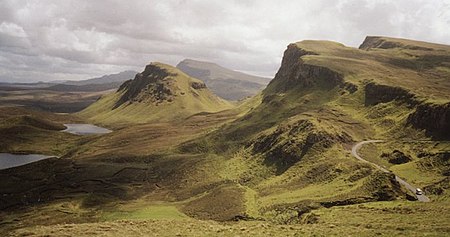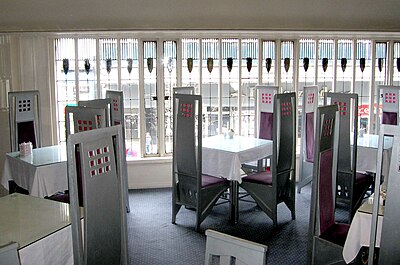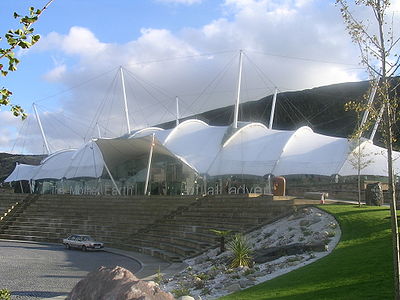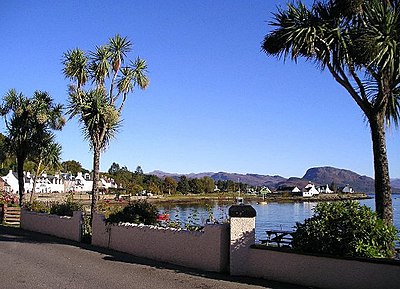Portal:Scotland/Selected picture/2008
| If you wish to suggest a possible candidate for selected article, picture or quote, see here. |
Months in 2008
[edit]- January

A crannóg (pronounced /krəˈno:g/ or /ˈkrɑno:g/ or /ˈkranag/) is an ancient artificial island or natural island in Scotland and Ireland, used for a settlement. The name may also refer to a wooden platform erected on shallow loch floors, but understandably few remains of this sort have been found. The name crannóg derives from crannoge, from Middle Irish crannóc, from Old Irish, from crann, tree.
- February

Dornoch Cathedral is a parish church in the Church of Scotland, serving the small Sutherland town of Dornoch, in the Scottish Highlands. It was built in the 13th century, in the reign of King Alexander II (1214-49) and the episcopate of Gilbert de Moravia (d. 1245) (later Saint Gilbert of Dornoch) as the cathedral church of the diocese of Caithness (moved to Dornoch from Halkirk).
- March

The Isle of Skye, commonly known as Skye, is the largest and most northerly island in the Inner Hebrides of Scotland. In Scottish Gaelic it is commonly referred to as An t-Eilean Sgiathanach ("The Winged Isle").
- April

The Willow Tearooms are tearooms at 217 Sauchiehall Street, Glasgow, Scotland, designed by internationally renowned architect Charles Rennie Mackintosh, which opened for business in October 1903. They quickly gained enormous popularity, and are the most famous of the many Glasgow tearooms that opened in the late 19th and early 20th century.
- May

Our Dynamic Earth is a Scottish science centre and prominent conference venue and visitor attraction located in Holyrood, Edinburgh, beside the Scottish Parliament Building.
The centre opened in 1999 as one of the first major projects supported by the UK's Millennium Commission. The project was the centrepiece of an urban regeneration plan which served to bring vitality to the former industrial land at the lower end of the Royal Mile and is housed within a distinctive landmark building, the William Younger Centre.
- June

Glen Coe (Gleann Comhann in Gaelic ) is a glen in the Highlands of Scotland. It lies in the southern part of the Lochaber committee area of Highland Council, and was formerly part of the county of Argyll. It is often considered one of the most spectacular and beautiful places in Scotland, and is a part of the designated National Scenic Area of Ben Nevis and Glen Coe.
- July

The Lewis chessmen (named after their find-site) belong to some of the few complete medieval chess sets that have survived until today. The chessmen are believed to have been made in Norway, perhaps by craftsmen in Trondheim (where similar pieces have been found), sometime during the 12th century.
- August

Plockton (Am Ploc/Ploc Loch Aillse in Gaelic) is a village in the Highlands of Scotland, with a population of 378. It is a picturesque settlement on the shores of Loch Carron. It faces east, away from the prevailing winds, which together with the North Atlantic Drift gives it a mild climate allowing palm trees (actually cabbage trees) to grow.
- September

One of the oldest and most important religious centres in western Europe, Iona Abbey is considered the point of origin for the spread of Christianity throughout Scotland. Iona Abbey is located on the Isle of Iona, just off the Isle of Mull on the West Coast of Scotland. The abbey was founded by St. Columba after he had been linked to founding Oronsay Priory.
- October

The Torridon Hills surround Torridon village in the Northwest Highlands of Scotland. The name is usually applied to the mountains to the north of Glen Torridon. These are all made of a type of sandstone, known as Torridonian sandstone (see Geology of the United Kingdom), which over time has become eroded to produce the unique characteristics of the Torridon hills.
- November

Eilean Glas Lighthouse was one of the original four lights to be commissioned by the Commissioners of the Northern Lights and the first in the Hebrides (the others were Kinnaird Head, Mull of Kintyre and North Ronaldsay).
The engineer who built these lighthouses was Thomas Smith. The light was first displayed in 1789 and the original tower was replaced in 1824 by Smith's stepson Robert Stevenson.
- December

Lochinver (Loch an Inbhir in Gaelic) is a village on the coast in the Assynt district of Sutherland, Highland, Scotland. A few miles northeast is Loch Assynt which is the source of the River Inver which flows into Loch Inver at the village. There are 200 or so lochans in the area which makes the place very popular with anglers.

